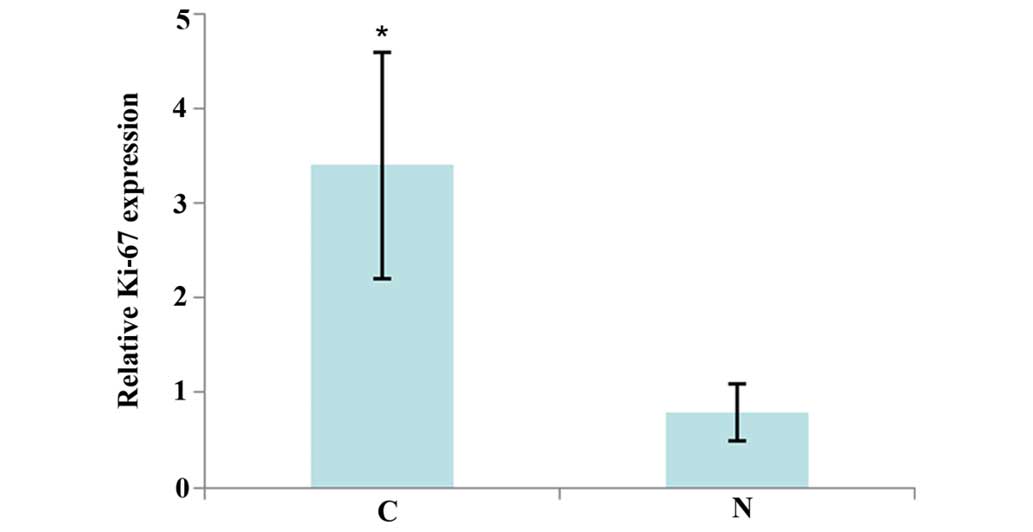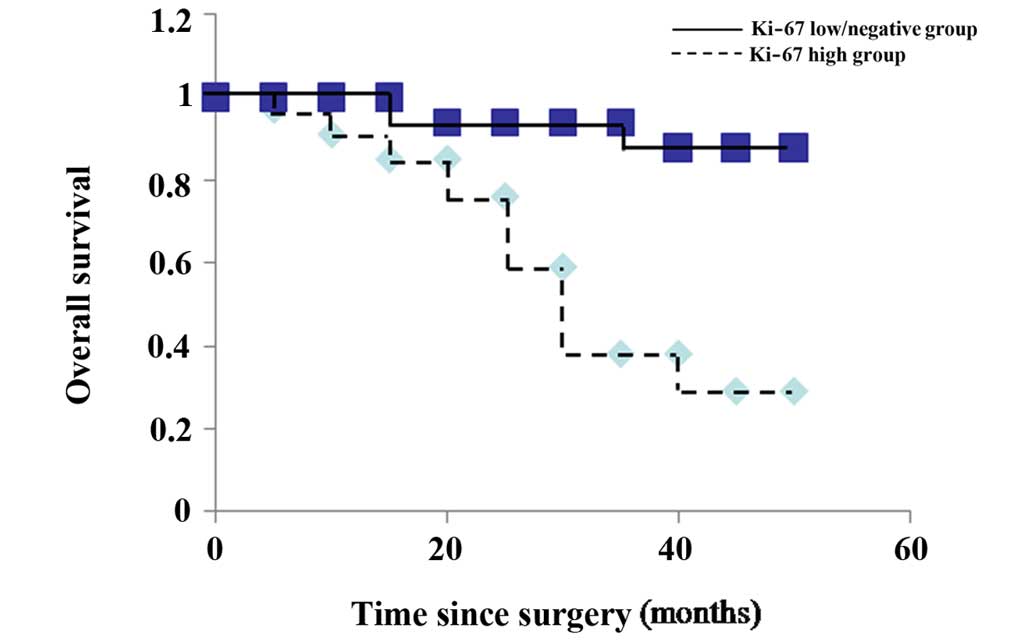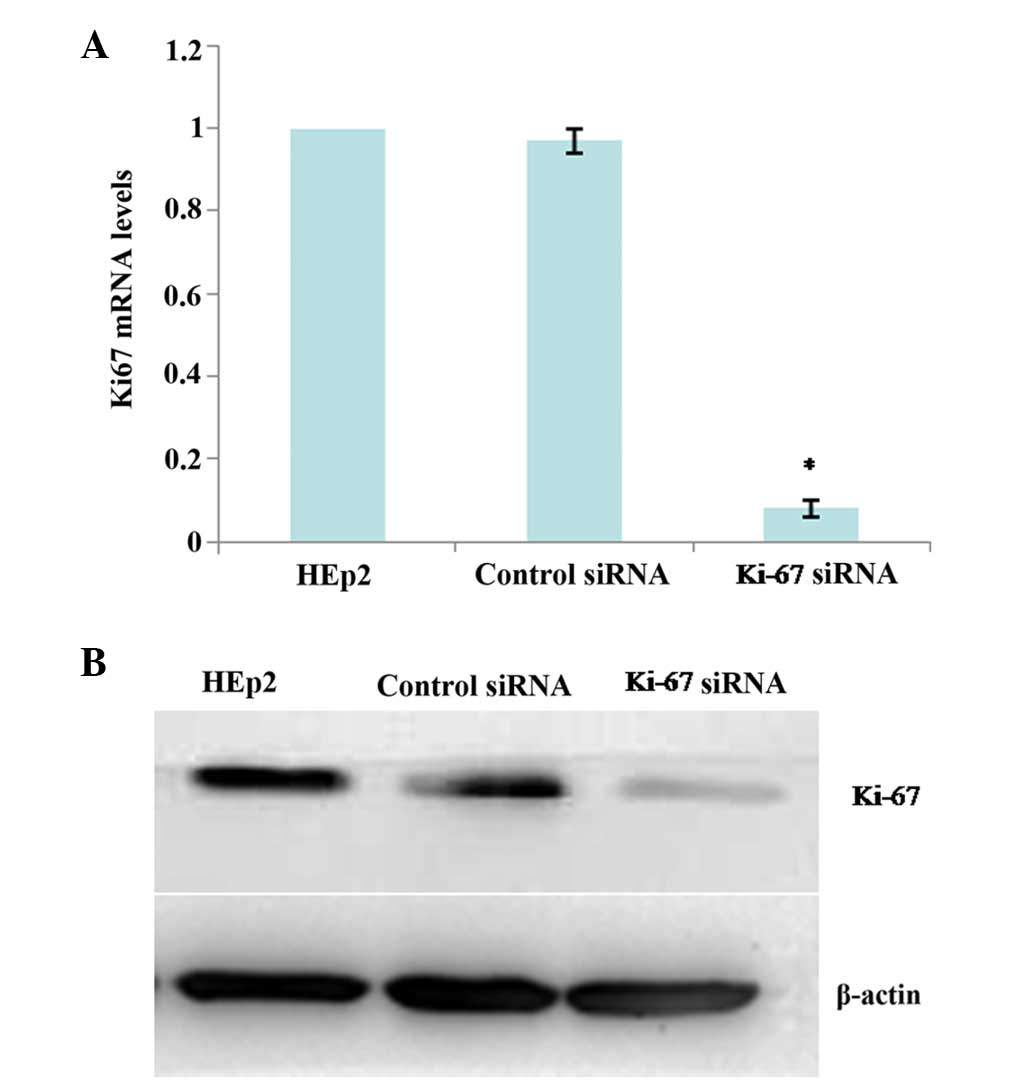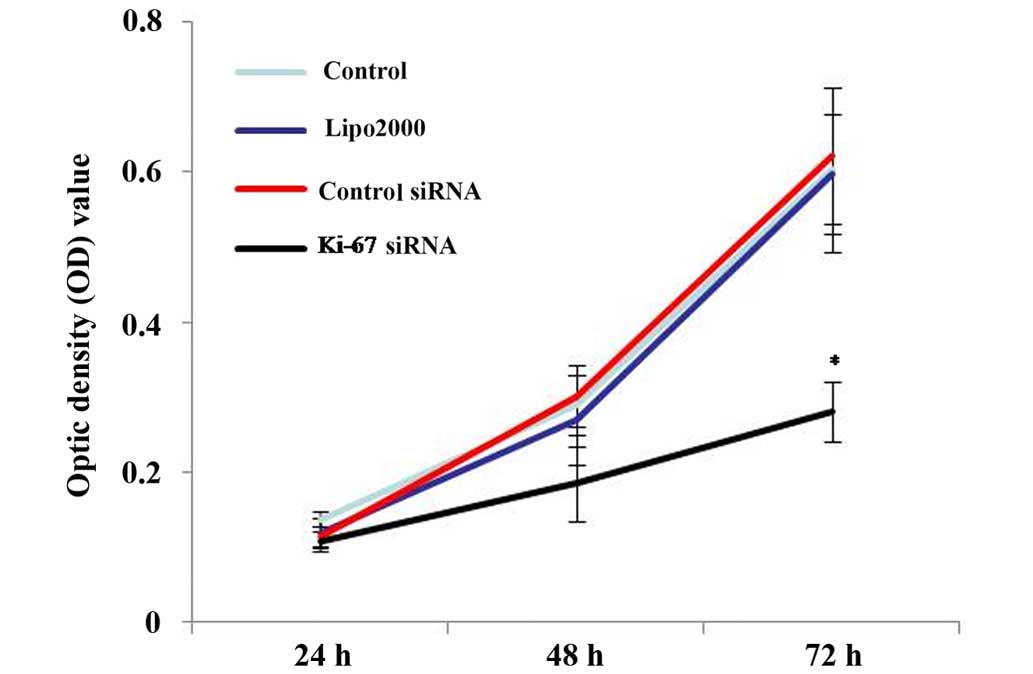|
1
|
Markou K, Christoforidou A, Karasmanis I,
Tsiropoulos G, Triaridis S, Constantinidis I, Vital V and Nikolaou
A: Laryngeal cancer: Epidemiological data from Νorthern Greece and
review of the literature. Hippokratia. 17:313–318. 2013.PubMed/NCBI
|
|
2
|
Iovănescu GH, Poenaru M, Doroş C and
Borugă O: Histopathological prognostic and risk factors in patients
with laryngeal neoplasms. Rom J Morphol Embryol. 54:1087–1092.
2013.PubMed/NCBI
|
|
3
|
Traoré CB, Kamaté B, Kéita M, Tchoupa MM,
Timbo SK, Ag MA and Bayo S: Laryngo-pharyngeal cancer at a health
service of last resort in Mali: Anatomo-clinical and therapeutic
aspects. Mali Med. 23:51–54. 2008.(In French).
|
|
4
|
Arshad H, Ahmad Z and Hasan SH: Gliomas:
Correlation of histologic grade, Ki67 and p53 expression with
patient survival. Asian Pac J Cancer Prev. 11:1637–1640.
2010.PubMed/NCBI
|
|
5
|
Klintman M, Bendahl PO, Graban D, Lövgren
K, Malmström P and Fernö M: South Sweden Breast Cancer Group: The
prognostic value of Ki67 is dependent on estrogen receptor status
and histological grade in premenopausal patients with node-negative
breast cancer. Mod Pathol. 23:251–259. 2010. View Article : Google Scholar : PubMed/NCBI
|
|
6
|
Tadbir AA, Pardis S, Ashkavandi ZJ,
Najvani AD, Ashraf MJ, Taheri A, Zadeh MA and Sardari Y: Expression
of Ki67 and CD105 as proliferation and angiogenesis markers in
salivary gland tumors. Asian Pac J Cancer Prev. 13:5155–5159. 2012.
View Article : Google Scholar : PubMed/NCBI
|
|
7
|
Naderi N Jalayer, Tirgari F, Kharazi-Fard
MJ and Parsa F Farahani: A study on the relationship between
clinical features with Ki67 expression and eosinophil cells
infiltration in oral squamous cell carcinoma. Med J Islam Repub
Iran. 28:1152014.PubMed/NCBI
|
|
8
|
Thompson L: World Health Organization
classification of tumours: pathology and genetics of head and neck
tumours. Ear Nose Throat J. 85:742006.PubMed/NCBI
|
|
9
|
Schmittgen TD and Livak KJ: Analyzing
real-time PCR data by the comparative C(T) method. Nat Protoc.
3:1101–1108. 2008. View Article : Google Scholar : PubMed/NCBI
|
|
10
|
Edge SB and Compton CC: The American Joint
Committee on Cancer: The 7th edition of the AJCC cancer staging
manual and the future of TNM. Ann Surg Oncol. 17:1471–1474. 2010.
View Article : Google Scholar : PubMed/NCBI
|
|
11
|
Zhou Y, Jiang HG, Lu N, Lu BH and Chen ZH:
Expression of ki67 in papillary thyroid microcarcinoma and its
clinical significance. Asian Pac J Cancer Prev. 16:1605–1608. 2015.
View Article : Google Scholar : PubMed/NCBI
|
|
12
|
Li LT, Jiang G, Chen Q and Zheng JN: Ki67
is a promising molecular target in the diagnosis of cancer
(review). Mol Med Rep. 11:1566–1572. 2015.PubMed/NCBI
|
|
13
|
Liu HB, Gao XX, Zhang Q, Liu J, Cui Y, Zhu
Y and Liu YF: Expression and prognostic implications of FOXO3a and
Ki67 in lung adenocarcinomas. Asian Pac J Cancer Prev.
16:1443–1448. 2015. View Article : Google Scholar : PubMed/NCBI
|
|
14
|
Chen LY, Tsang JY, Ni YB, Chan SK, Chan
KF, Zhang S and Tse GM: Bcl2 and Ki67 refine prognostication in
luminal breast cancers. Breast Cancer Res Treat. 149:631–643. 2015.
View Article : Google Scholar : PubMed/NCBI
|
|
15
|
Beuschlein F, Weigel J, Saeger W, Kroiss
M, Wild V, Daffara F, Libé R, Ardito A, Al Ghuzlan A, Quinkler M,
et al: Major prognostic role of ki67 in localized adrenocortical
carcinoma after complete resection. J Clin Endocrinol Metab.
100:841–849. 2015. View Article : Google Scholar : PubMed/NCBI
|
|
16
|
Li N, Deng W, Ma J, Wei B, Guo K, Shen W,
Zhang Y and Luo S: Prognostic evaluation of Nanog, Oct4, Sox2,
PCNA, Ki67 and E-cadherin expression in gastric cancer. Med Oncol.
32:4332015. View Article : Google Scholar : PubMed/NCBI
|
|
17
|
Leopardi G, Serafini G, Simoncelli C,
Ludovini V, Pistola L and Altissimi G: Ki67 and p53 in laryngeal
epithelial lesions: Correlations with risk factors. Acta
Otorhinolaryngeal Ital. 21:243–247. 2001.(In Italian).
|
|
18
|
Liu M, Lawson G, Delos M, Jamart J,
Chatelain B, Remacle M and Marbaix E: Prognostic value of cell
proliferation markers, tumour suppressor proteins and cell adhesion
molecules in primary squamous cell carcinoma of the larynx and
hypopharynx. Eur Arch Otorhinolaryngol. 260:28–34. 2003.PubMed/NCBI
|
|
19
|
Teppo H, Soini Y, Melkko J, Koivunen P and
Alho OP: Prognostic factors in laryngeal carcinoma: The role of
apoptosis, p53, proliferation (Ki-67) and angiogenesis. APMIS.
111:451–457. 2003. View Article : Google Scholar : PubMed/NCBI
|
|
20
|
Normanno N, De Luca A, Bianco C, Strizzi
L, Mancino M, Maiello MR, Carotenuto A, De Feo G, Caponigro F and
Salomon DS: Epidermal growth factor receptor (EGFR) signaling in
cancer. Gene. 366:2–16. 2006. View Article : Google Scholar : PubMed/NCBI
|
|
21
|
Buckley AF, Burgart LJ, Sahai V and Kakar
S: Epidermal growth factor receptor expression and gene copy number
in conventional hepatocellular carcinoma. Am J Clin Pathol.
129:245–251. 2008. View Article : Google Scholar : PubMed/NCBI
|
|
22
|
Carcereny E, Morán T, Capdevila L, Cros S,
Vilà L, de Los Llanos Gil M, Remón J and Rosell R: The epidermal
growth factor receptor (EGRF) in lung cancer. Transl Respir Med.
3:12015. View Article : Google Scholar : PubMed/NCBI
|
|
23
|
Carlsson J, Wester K, De La Torre M,
Malmström PU and Gårdmark T: EGFR-expression in primary urinary
bladder cancer and corresponding metastases and the relation to
HER2-expression. On the possibility to target these receptors with
radionuclides. Radiol Oncol. 49:50–58. 2015. View Article : Google Scholar : PubMed/NCBI
|
|
24
|
Li F, Kang N, Fu W, Sun X, Gao H and Sun
K: Detection of epidermal growth factor receptor gene amplification
in human laryngeal carcinomas by means of fluorescence in situ
hybridization. Zhonghua Yi Xue Yi Chuan Xue Za Zhi. 17:278–280.
2000.(In Chinese). PubMed/NCBI
|
|
25
|
Li M, Wei M, Jiang Z, Wei H, Lu W, Dou W
and Lu S: BRAF overexpression induces rampant glioma proliferation
independent of phospho-EGFR expression. Adv Clin Exp Med.
23:893–899. 2014. View Article : Google Scholar : PubMed/NCBI
|
|
26
|
Yang Y, Xuan J, Yang Z, Han A, Xing L, Yue
J, Hu M and Yu J: The expression of epidermal growth factor
receptor and Ki67 in primary and relapse nasopharyngeal cancer: A
micro-evidence for anti-EGFR targeted maintenance therapy. Med
Oncol. 29:1448–1455. 2012. View Article : Google Scholar : PubMed/NCBI
|
|
27
|
Onder TT, Gupta PB, Mani SA, Yang J,
Lander ES and Weinberg RA: Loss of E-cadherin promotes metastasis
via multiple downstream transcriptional pathways. Cancer Res.
68:3645–3654. 2008. View Article : Google Scholar : PubMed/NCBI
|
|
28
|
Nakagawa Y, Ohira M, Kubo N, Yamashita Y,
Sakurai K, Toyokawa T, Tanaka H, Muguruma K, Shibutani M, Yamazoe
S, et al: Tumor budding and E-cadherin expression are useful
predictors of nodal involvement in T1 esophageal squamous cell
carcinoma. Anticancer Res. 33:5023–5029. 2013.PubMed/NCBI
|
|
29
|
Rodrigo JP, Dominguez F, Alvarez C,
Manrique C, Herrero A and Suárez C: Expression of E-cadherin in
squamous cell carcinomas of supraglottic larynx with correlations
to clinicopathological features. Eur J Cancer. 38:1059–1064. 2002.
View Article : Google Scholar : PubMed/NCBI
|
|
30
|
Simionescu C, Mărgăritescu C, Stepan A,
Georgescu CV, Niculescu M and Muntean M: The utility of p16,
E-cadherin and Ki67 in cervical squamous intraepithelial lesions
diagnosis. Rom J Morphol Embryol. 51:621–626. 2010.PubMed/NCBI
|





















